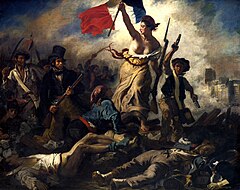July Revolution

Liberty Leading the People by Eugène Delacroix: an allegorical painting of the July Revolution.
|
|
| Date | 26–29 July 1830 |
|---|---|
| Location | France |
| Also known as | The July Revolution |
| Participants | French society |
| Outcome | Abdication of Charles X Ascension of Louis Philippe to the French throne and establishment of the constitutional July Monarchy |
The French Revolution of 1830, also known as the July Revolution, Second French Revolution or Trois Glorieuses in French, saw the overthrow of King Charles X, the French Bourbon monarch, and the ascent of his cousin Louis Philippe, Duke of Orléans, who himself, after 18 precarious years on the throne, would in turn be overthrown in 1848. It marked the shift from one constitutional monarchy, the Bourbon Restoration, to another, the July Monarchy; the transition of power from the House of Bourbon to its cadet branch, the House of Orléans; and the replacement of the principle of hereditary right by popular sovereignty. Supporters of the Bourbon would be called Legitimists, and supporters of Louis Philippe Orléanists.
On 16 September 1824, Charles X ascended to the throne of France. He was the younger brother of Louis XVIII, who, upon the defeat of Napoleon I, and by agreement of the Allied powers, had been installed as King of France. Both Louis and Charles ruled by hereditary right rather than Revolution.
Upon the abdication of Napoleon in 1814, continental Europe, and France in particular, was in a state of disarray. The Congress of Vienna met to redraw the continent's political map. Although there were many European countries attending the Congress, there were four major powers that controlled the decision-making: the United Kingdom, represented by its Foreign Secretary Viscount Castlereagh; Austria, represented by the Chief Minister (and Chairman of the Congress) Klemens, Fürst von Metternich; Russia, represented by Emperor Alexander I; and Prussia, represented by King Frederick William III. Another very influential person at the Congress was Charles Maurice de Talleyrand, a French diplomat under Napoleon. Although France was considered an enemy state, Talleyrand was allowed to attend the Congress because he claimed that he had only cooperated with Napoleon under duress.
...
Wikipedia
